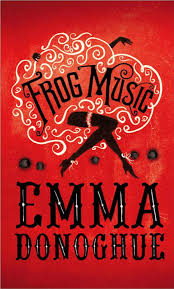 Published by Picador 31 March 2014
Published by Picador 31 March 2014
403pp, hardback, £16.99
Reviewed by Lucy Yates
We’re in San Francisco in 1876 and life in Emma Donoghue’s eighth novel is hazardous. If smallpox, earthquakes or neglectful baby farms don’t get you, then shotgun blasts through an open window will. The latter is what kills Jenny, a cross-dressing frog catcher, at the start of this unusual novel, leaving her friend Blanche frightened for her life and desperate to find the murderer. The prime suspect is Blanche’s ex-lover, Arthur, who is also suspected of abducting her son.
On her recent book tour of the UK, Donoghue described Frog Music as her attempt at crime fiction but the novel both frustrates and transcends this genre. The action is hamstrung by the fact that Blanche, an exotic dancer at the House of Mirrors, is essentially passive in her quest for Jenny’s killer. Donoghue has tried to mask this by including lengthy passages of deliberation where Blanche recasts events in her thoughts and often tries to alter their weight and significance in order to create forward momentum, but ultimately this doesn’t convince. Despite this flaw, however, Donoghue’s unique talent – her voice and flair for vivid, original description – compels you to stay in her world.
The characters in Frog Music are highly engaging, each one appropriately complex and rounded: Blanche is thoroughly sympathetic, despite being that most abused literary creation – a good-natured whore – while Jenny, engaging and infuriating by turns, is charismatic. Arthur and his friend, the hairy-backed Ernest, are so convincing as charming playboy gamblers that it take a while for the reader to register, in the same way that Blanche deceives herself, that they are leeches, living off her. Donoghue shows her real lightness of touch in the skilful evocation of Pet’t, Blanche’s damaged son, whose mistreatment at a baby farm means he will only show affection towards a wooden doorknob.
It’s hard not be beguiled by this cast but the coda Donoghue add to the end of the novel to inform the reader that Blanche lived for less than a year after rescuing her son is a mistake, giving a glimpse of a far more poignant ending than she has managed to conjure with her simple description of Blanche’s departure from San Francisco. Ultimately Frog Music ends with a croak rather than the swelling chorus a work of such potential deserves.
